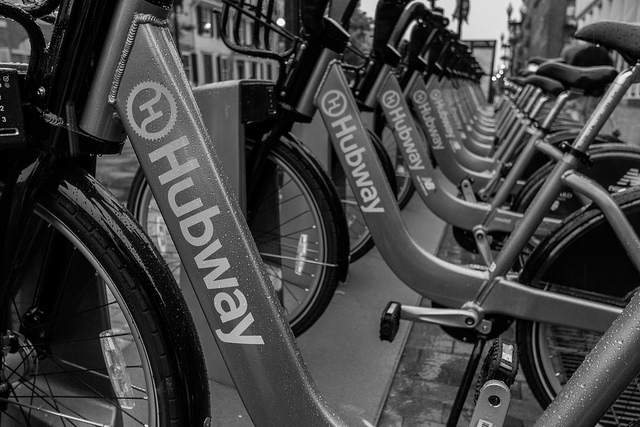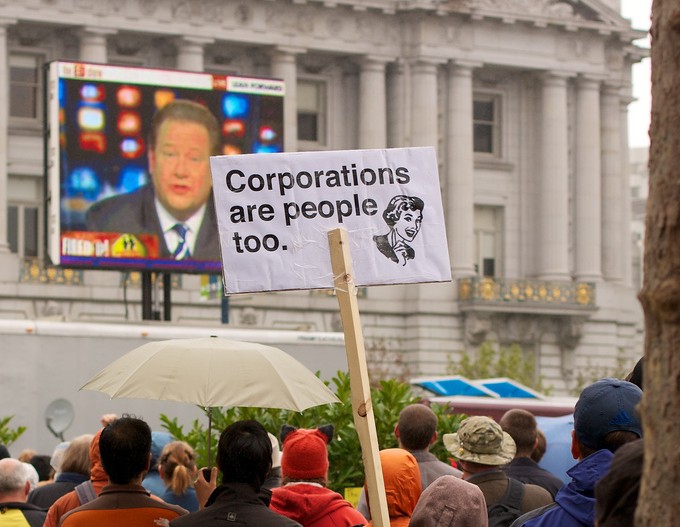The winter cityscape of Boston is peppered with snow banks and heavy coats. The Hubway stations you see popping up overnight are a sure indicator that warmer weather is on the way. About to start its third season of operation, Hubway launched in the summer of 2011 as Boston’s first bike sharing program. Hubway may be the most visible program of Boston’s successful effort to turn around its reputation from one of the worst places to bike in a city. Mayor Thomas Menino launched the Boston Bikes Initiative in 2007, and since Hubway’s launch, bike ridership has more than doubled.[1] By its winter shutdown, Hubway riders have logged more than 670,000 trips – a number that is 50 percent more than the program’s planners anticipated.[2] This success and popularity mirror the worldwide growth and popularity of bike share programs.
The basic concept of bike sharing programs is very simple. However, its implementation has been modified and experimented upon since its first generation in 1965. Amsterdam established the first bike sharing program, known as White Bikes, in which included fifty bikes colored in white were left throughout the inner city area for free use by the general public. Unfortunately, many of the bikes were left damaged or stolen completely.
In 1995, Copenhagen added a coin deposit system their bicycle inventory. Now bikes were unlocked for use only after depositing a coin into the docking station, which would be returned once the bike had been locked back into the system. Although it was step up from the first generation of bike share programs, the lack of a tracking system for the bikes still led to damaged and stolen bicycles.
New information technologies further improved bike sharing programs to the third generation “IT” model we see most prevalently today. The bikes themselves would now be tracked by their check-ins and check-outs. With credit cards, smart chips, or some other identifying platform, users have their names attached to the bikes, allowing for immediate identification in case of damage or theft. Hubway users can either swipe their credit cards to rent out a bike or sign up for an annual membership that allows them access via a smart-chip-embedded “key” for access.[3] Vélo à la Carte in Rennes, France was the first of these IT-systems established in 1998. In the summer of 2010, Capital Bikeshare in Washington, D.C. became the first IT-system in North America.
Bike share programs do not just serve to add bicycling as a mode of transportation; they also augment transportation systems at large. With more than 61,000 bikes in operation, the Hangzhou Public Bicycle program in China is the largest bike share program in the world. A March 2010 survey of the program’s members and non-members found that many were using the bikes in addition to transit and even automobiles. In fact, members of the program reported twice the rate of car ownership (22 percent) as non-members (11 percent)
The “last mile”[4] problem is an urban planning phenomenon about limited accessibility. Public transit systems are only as good as they are accessible. While many metropolitan areas have public transit systems, many people do not live close to these transit lines due to urban sprawl. The “last mile” alludes to the gap between a commuter’s origin and the transit that could bring them to their destination or vice versa. Despite a rail station being a block away from a commuter’s workplace, if that commuter still has to walk a mile to get to his or her closest rail station, then the commuter may find it more convenient to just drive the whole way. Bike sharing is proving to be a feasible gap-closer with cheaper costs, a smaller footprint, and more flexibility.
Indeed, the fourth generation of bike sharing may be centered about this multi-modal concept. In this generation, bike share stations would be planned to mold seamlessly with public transit and other modes of transportation (i.e. a unified pay system, locations next to transit stations). Further components like portable docking stations, solar panel electric systems, and incentives for users to leave bikes at empty stations for better bike distribution would further augment this innovative generation.
Despite being not even three years old, Hubway has already produced positive results. The Federal Department of Transportation,[5] which has supplied grant money for Hubway, stated that in the first year alone, Hubway helped offset 155 tons of carbon emissions. While cars burn gas, the only burning involved with Hubway cyclists was the burning of 20 million calories. Nicole Freedman, director of Boston Bikes, has stated that 13 percent of Hubway trips were “car replacement” trips, meaning that out of the 675,000 trips taken in Hubway’s first two years, 87,750 of this trips would have otherwise been taken by car.
Bike sharing programs extend the benefits of bicycling to the public and metropolitan area en masse. They help reduce traffic from other modes of transportation and reduce carbon emissions in an environmentally friendly way. Furthermore, other benefits not usually associated with bicycling are starting to emerge. A study out of Portland is setting out to prove empirically that bicyclists may spend more at businesses than their driving counterparts due to them visiting businesses more frequently.[6] With Hubway stations expanded into rail inaccessible areas like Dudley Square and Somerville, businesses nearby may benefit from the connection to the entire bike sharing system.
Increasing the amount of bicyclists in a given city makes bicycling safer,[7] further encouraging more bicyclists. With bike share participation becoming a gateway into bicycling for many would-be bicyclists, bike share programs could prove to be an effective tool in jump-starting the positive effects associated with bicycling. These benefits would serve more than just bike sharers and bicyclists. They would serve everybody.
Justin Bensan
Political Science ’14
[1] http://www.cityofboston.gov/bikes/statistics.asp
[3] http://www.uctc.net/access/39/access39_bikesharing.shtml
[5] http://fastlane.dot.gov/2012/10/boston-a-better-city-thanks-to-hubway-bike-sharing.html#.UUJlR9HwJ68
[7] http://safetrec.berkeley.edu/newsletter/Spring04/JacobsenPaper.pdf



